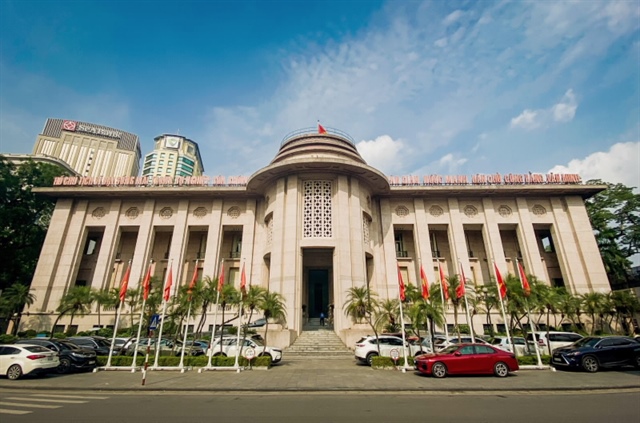|
US says Vietnam not manipulating currency
The US gave a positive assessment of Vietnam's monetary and exchange rate policies.
Vietnam remains on the "watch list", but is not manipulating its currency, the US Treasury Department gave the findings in its latest report "Macroeconomic and Foreign Exchange Policies of Major Trading Partners of the United States."

The State Bank of Vietnam. Source: SBV
|
This report evaluates the potential for currency manipulation of major trading partners based on three criteria: bilateral trade surplus with the US, current account surplus, and prolonged, one-sided foreign exchange market intervention.
Specifically, the first two criteria are a bilateral goods trade surplus with the US exceeding $15 billion and a current account surplus exceeding 3% of GDP. The third criterion is based on the central bank's net foreign exchange purchases over 12 months.
If an economy meets two of these three criteria, the US places it on the "watch list." Once on this list, a country remains there for at least two consecutive reporting periods to ensure long-term improvement.
In this report, the US gave a positive assessment of Vietnam's monetary and exchange rate policies. Vietnam is one of seven economies (along with China, Japan, Taiwan, Malaysia, Singapore, and Germany) on the watch list, meeting two criteria: a bilateral goods trade surplus and a current account surplus.
By the end of 2023, Vietnam's current account surplus was about 5.8% of GDP. The current account balance includes the trade balance (reflecting the difference between export and import values), net income from services, and net income from workers and investors abroad, showing transactions in goods and services between residents and non-residents.
Vietnam's current account balance returned to a significant surplus after deficits in 2021 and 2022 due to Covid-19 production restrictions, which had driven up import prices.
While goods exports in 2023 were lower than in previous years, the trade balance improved due to a slower recovery in imports as factories adjusted foreign orders. The current account surplus was also supported by a recovery in domestic tourism, higher remittances, and lower profit repatriation by foreign investors.
Vietnam's bilateral goods trade surplus with the US reached $103 billion by the end of 2023. According to the US Treasury, this surplus has significantly increased over the past five years, primarily due to trade in goods, led by electronics and machinery, though the rate of increase has slowed. Vietnam currently has the third-largest goods trade surplus with the US.
Additionally, Vietnam's foreign exchange reserves at the end of 2023 stood at $88.1 billion, equivalent to 21% of GDP. The report notes that the State Bank of Vietnam (SBV) made net foreign exchange purchases of about $7 billion over four quarters (through December 2023), equivalent to 1.5% of GDP. Despite significant depreciation pressure on the dong at the end of the year, mainly reflecting global and US macroeconomic developments, Vietnam moderately purchased foreign exchange in early 2023 to replenish reserves.
Thanks to enhanced engagement discussions, the US Treasury and the SBV reached an agreement in July 2021 to address the former’s concerns about Vietnam's monetary practices. The SBV committed to modernizing and increasing the transparency of its monetary policy and exchange rate management framework, without using exchange rate policies to gain unfair competitive advantage.
In the Joint Statement on upgrading Vietnam-US relations to a Comprehensive Strategic Partnership, the US also commended Vietnam's continued efforts to modernize and further enhance the transparency of its monetary and exchange rate policy framework.
Based on the Comprehensive Strategic Partnership between the two countries, the SBV will continue to coordinate with relevant ministries to maintain close cooperation and establish regular and effective communication channels with the US Treasury. This is aimed at enhancing mutual understanding, sharing information, and addressing issues of mutual concern in a timely manner.
The US publishes this monitoring report twice a year for major trading partners.
Hanoi Times
|